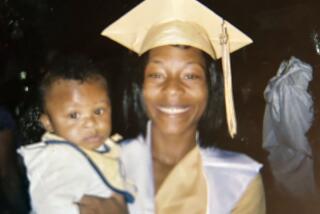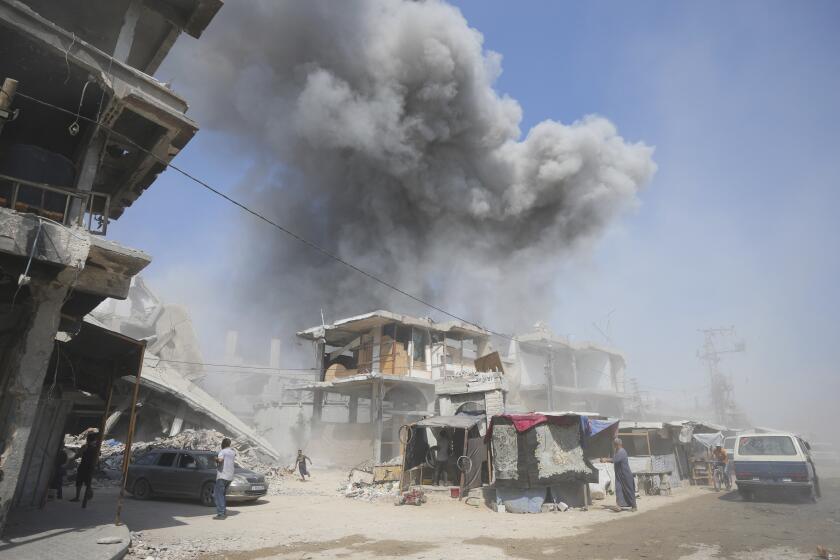A Shattered Peace
The nightmare began Dec. 14, 1994, when four men broke into Jim and Sylvia Hollingsworth’s Pasadena home in the middle of the night.
They raped Sylvia, tied up Jim and pistol-whipped him, and brandished a revolver at the Hollingsworths’ 7-year-old daughter. They stole change from the child’s piggy bank and took Sylvia’s wedding ring. They threatened retaliation if police were notified.
For the record:
12:00 a.m. June 8, 1997 For the Record
Los Angeles Times Sunday June 8, 1997 Home Edition Life & Style Part E Page 3 View Desk 1 inches; 32 words Type of Material: Correction
Impact of Rape--In a story on rape’s effect on families in the June 1 Life & Style, the Miller family’s finances were incorrectly portrayed. Rob Miller’s past earnings supported the family while he and his wife, Lyn, were out of work.
And during the hour that the men taunted and terrorized their victims, they may have destroyed a family.
Feeling alternately emasculated, guilty and angry, Jim said the rape was emotionally devastating. The couple has been on and off antidepressants. They had to sell their home abruptly and at a loss because their now-9-year-old daughter couldn’t bear to return to the crime scene. And Jim, who dressed in Armani suits every morning for work as an executive for an electronics company, has not held a steady job since his employer closed his branch six months after the attack.
Sylvia said the two have stayed in the marriage for their daughter’s sake. They’re cordial, she said, but not the same.
They are learning what few activist groups and rape counselors ever tell victims: Like no other crime, rape not only brutalizes the victim, it often destroys her family.
Of all the studies that focus on rape, few concentrate on the crime’s effect on the victims’ families and significant others. But a book that is scheduled for completion this summer by researchers in Virginia and Santa Cruz indicates that as many as half of all relationships fail after the woman has been raped.
“It’s a hidden issue,” said Linda BloomBecker, a rape survivor who began research for her book in progress, “Shared Trauma: Long-Term Effects on Survivors and Their Mates,” in 1986. “It’s not getting enough attention.”
According to the research, a mate’s response to the rape has a direct impact on the couple’s survival.
But few rape treatment centers have the funding to offer counseling for a victim’s family and, without someone to talk to, men often don’t know how to respond, said Jay BloomBecker, Linda’s husband and a Santa Cruz attorney; he began informally counseling victims’ mates after Linda began her research.
“The mate’s dilemma is his feeling of powerlessness. He can’t undo what’s happened,” he said. “Men need to talk about it to other men.”
That advice is easier said than followed.
Like many husbands, Jim Hollingsworth’s social circle consists mostly of his wife’s friends, and he has had few people to turn to for his own needs.
“Even though I have the support of my family, they’re at a distance,” he said.
On the day one of his wife’s attackers was convicted, Jim stood amid a group of Sylvia’s friends outside the Pasadena courthouse, watching them cry and laugh and hug his wife.
“I’m a private person who keeps things inside,” Jim said. “I’m just putting one foot in front of the other and trying to get through it. It’s about all you can do.”
The lack of a strong support system for men only exacerbates a couple’s problem: If a mate is expected to sympathize at a time when he is also traumatized, more stress will be added to the relationship, said Claire N. Kaplan, sexual assault educational coordinator at the University of Virginia and co-author of “Shared Trauma” with BloomBecker.
Of the nine couples BloomBecker initially interviewed, only four were still together, a ratio in keeping with a 1978 study published in the book “Rape: Helping the Victim” (Medical Economics Co., Book Division, 1978), which concluded that 50% to 80% of women lose their male partners following an attack.
Though that statistic is used by many researchers, counselors at the Santa Monica / UCLA Medical Center Rape Treatment Center--one of the few local facilities to offer rape therapy for couples--dismiss it as unfounded and misleading. They agree that rape puts the couple under tremendous stress, but many counselors said the problems posed are not insurmountable.
“What happens to a relationship depends upon what the relationship was like before the rape,” said Gail Abarbanel, director of the treatment center. “Good relationships can and do survive.”
Experts said the key to keeping a post-rape relationship together is the same prescription family therapists give for most marital troubles: communication.
It sounds obvious, but men and women have different approaches to facing trauma and are often “out of sync” with each other’s healing processes, said Dr. Alan McEvoy, author of “If She Is Raped” (Learning Publications Inc., 1984).
“Men’s natural tendency to take charge of a situation poses a problem,” McEvoy said. “Anger and the feeling of wanting to seek revenge is normal, but . . . it shifts the attention away from her needs. And it tends to cut off communication.”
True to the textbooks, Jim responded to the crime by raging against cracks in the system that allowed his family to be victimized. He worked doggedly to find out everything he could about the suspects--even managing to learn the juvenile offenses of Byron Fields, who had escaped from a California Youth Authority halfway house shortly before breaking into the Hollingsworths’ home.
He also began practicing his aim at a Duarte shooting range and has applied for a concealed weapons permit.
“Even though I was aware of the fact that there wasn’t anything I could do, there’s still this male thing of guilt I was dealing with,” Jim said. “Part of it manifested itself in burying myself in books and trying to figure out how the hell it could have happened.”
Sylvia deals with her pain by talking to a therapist and friends--and by throwing herself into her work.
A successful fragrance company executive, Sylvia had grown accustomed to earning the bulk of the family’s income. But when the electronics company Jim worked for folded and he became too clouded by anger to start a serious job search, Sylvia resentfully assumed the role of sole provider for the household.
“He had become obsessed with finding out who these guys were, and one month turned into two years,” she said. “I never got the chance to feel sorry for me.
“I found myself at times being very annoyed that he couldn’t just dive into his career. But I realized that probably for him, this is the way he has coped with it.”
Lyn Miller, a rape survivor and full-time activist who has befriended the Hollingsworths, said Sylvia’s experience is not unusual.
After she was raped in her son’s and husband’s presence in 1978, Miller was the sole family breadwinner for a full year. “My husband couldn’t concentrate, he was so angry,” she said. “He spent almost a year building a 10-foot wall around our house.”
The couple stayed together for a tumultuous 11 years before Miller’s husband, Rob, left in 1989.
Miller said she sees the same anger and humiliation in Jim as she saw in Rob, but because “Jim and Sylvia have some closure . . . they have a chance.”
The Hollingsworths only recently received that sense of closure: A juvenile involved in the crime was convicted earlier this year and, on April 30, a Pasadena Superior Court judge sentenced 23-year-old Fields to 153 years to life in prison.
Time will tell how the family will heal, but the Hollingsworths have said they hope to rebuild their relationship. And Jim said he feels ready to go back to work.
“There has been a difference in my attitude toward interviewing after the sentencing,” he said. “I’m acting less like a victim. A lot of the anger is gone, but I still have some work to do.”
In her diary entry on the day Fields was sentenced, Sylvia wrote that though they were closing a long, terrible chapter in their lives, much uncertainty remains.
“We . . . live not knowing whether our family unit will hold together,” she wrote. “Today it should be over, but it never will be. We will always be people that this has happened to. We’re just entering a new phase.”
More to Read
Sign up for Essential California
The most important California stories and recommendations in your inbox every morning.
You may occasionally receive promotional content from the Los Angeles Times.






